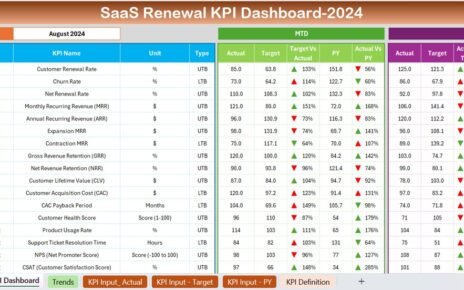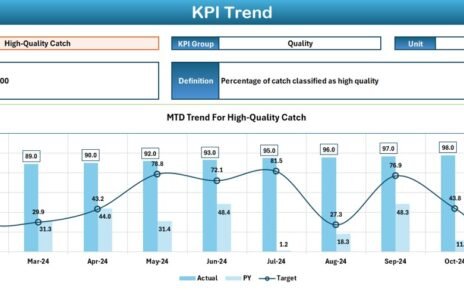In today’s fast-paced property management industry, the ability to quickly analyze and interpret key performance indicators (KPIs) is crucial. The Property Management KPI Dashboard in Excel is an invaluable tool for professionals aiming to streamline their operations and enhance decision-making. This comprehensive guide will delve into the functionalities, advantages, and best practices of utilizing such a dashboard.
Click to buy Property Management KPI Dashboard in Excel
Introduction to Property Management KPI Dashboards
A Property Management KPI Dashboard in Excel provides a dynamic way to monitor and assess various performance metrics that drive successful property management. This ready-to-use template is designed to offer a clear and concise view of your data, enabling quick insights and informed decisions.
Key Features of the Property Management KPI Dashboard
This dashboard comprises seven meticulously designed worksheets, each tailored to specific management needs:
Home Sheet:
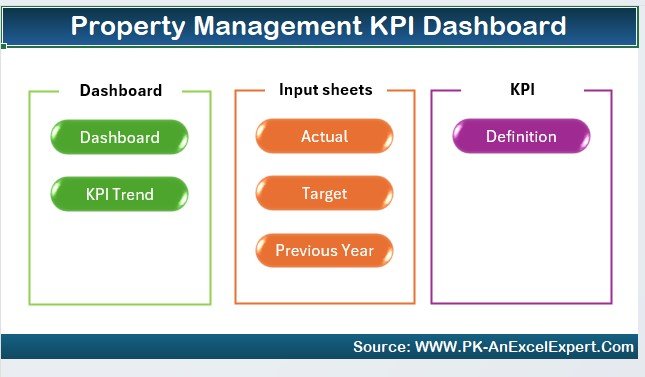
Click to buy Property Management KPI Dashboard in Excel
- Acts as the central index with convenient buttons for easy navigation to respective sheets.
Dashboard Sheet Tab:
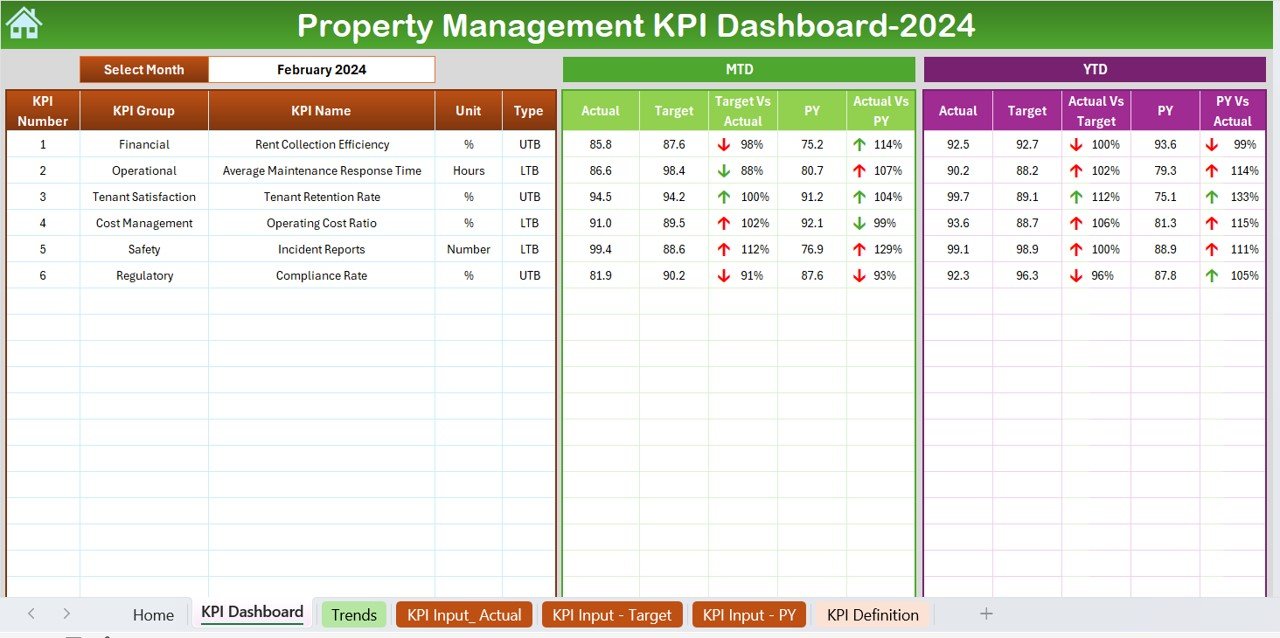
- The core of the dashboard where users can select a month from a dropdown to view corresponding data.
- Displays MTD (Month-to-Date) and YTD (Year-to-Date) actuals, targets, and previous year’s data, with visual comparisons like conditional formatting arrows indicating trends and deviations.
Click to buy Property Management KPI Dashboard in Excel
KPI Trend Sheet Tab:
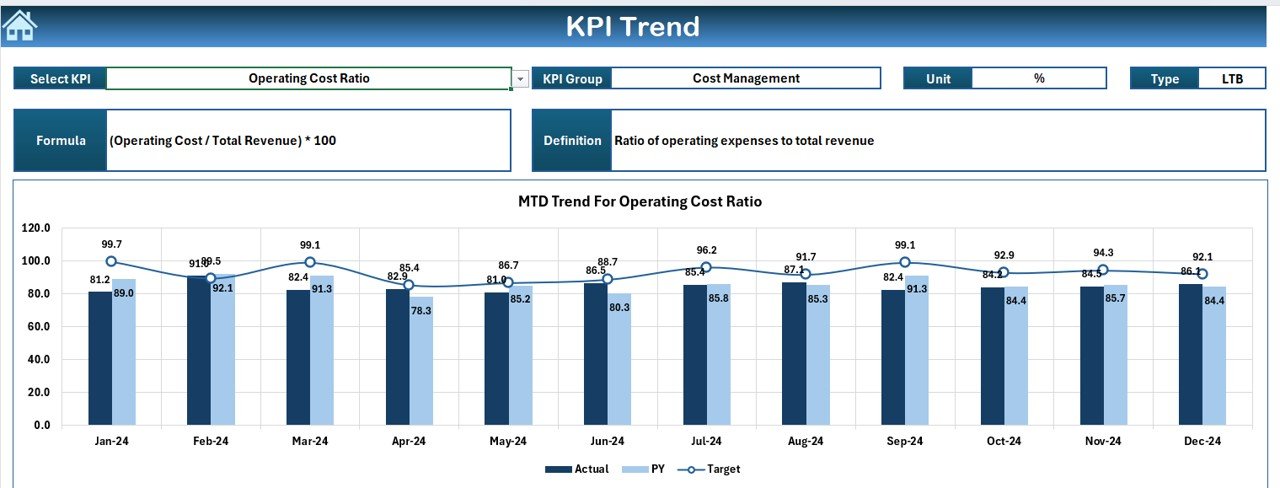
Click to buy Property Management KPI Dashboard in Excel
- Allows selection of a KPI from a dropdown menu, showcasing detailed attributes such as KPI group, unit, and type (indicative of whether a lower or higher value is favorable).
- Visual trends for MTD and YTD actuals versus targets and previous year figures are also featured.
Actual Numbers Input Sheet:

Click to buy Property Management KPI Dashboard in Excel
- Here, users input actual MTD and YTD figures for selected months, starting with the first month of the year.
Target Sheet Tab:

Click to buy Property Management KPI Dashboard in Excel
- Dedicated to entering monthly MTD and YTD target figures for each KPI.
Previous Year Number Sheet Tab:

Click to buy Property Management KPI Dashboard in Excel
- Used for recording the previous year’s data parallel to the current year for comparative analysis.
KPI Definition Sheet Tab:

Click to buy Property Management KPI Dashboard in Excel
- This tab is essential for defining KPI names, groups, units, formulas, and detailed definitions.
Advantages of Using a Property Management KPI Dashboard
Utilizing a KPI dashboard in property management brings several benefits:
- Enhanced Data Visualization: Graphical representations of data make trends and patterns easier to understand at a glance.
- Improved Accuracy: Automation reduces the risk of human error in data entry and calculation.
- Time Efficiency: Quick access to important metrics saves time, allowing for faster response to trends and anomalies.
- Strategic Decision Making: With real-time data and historical comparisons at your fingertips, making strategic decisions becomes more evidence-based.
Best Practices for Implementing Your KPI Dashboard
To maximize the effectiveness of your Property Management KPI Dashboard, consider the following best practices:
- Regular Updates: Keep your dashboard updated with real-time data to ensure accuracy in reporting and analysis.
- Training and Usage: Ensure all team members are adequately trained on how to use and interpret the dashboard.
- Customization: Adapt the dashboard to reflect specific needs and preferences of your property management operations.
- Security Measures: Implement appropriate security measures to protect sensitive data from unauthorized access.
Frequently Asked Questions About Property Management KPI Dashboards
Q1: How often should I update my KPI dashboard?
A: It’s best to update the dashboard data as often as new information becomes available, typically monthly for the most relevant and timely insights.
Q2: Can I customize the dashboard to fit my specific needs?
A: Yes, the dashboard is designed to be customizable. You can modify KPIs and the layout to better fit your organizational needs and reporting style.
Q3: What is the most critical KPI for property management?
A: While this can vary by specific business goals, common critical KPIs include occupancy rates, operational costs, and tenant satisfaction scores.
Q4: How can I ensure data security for my dashboard?
A: Use password protections, encrypted connections, and secure backups. Limit access to the dashboard to only those who require it for their role.
Click to buy Property Management KPI Dashboard in Excel
Visit our YouTube channel to learn step-by-step video tutorials
View this post on Instagram
Click to buy Property Management KPI Dashboard in Excel


